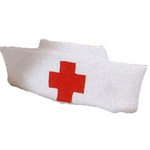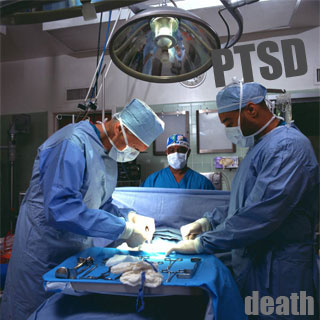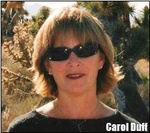 PTSD CAN AFFECT SURGERY OUTCOMES
PTSD CAN AFFECT SURGERY OUTCOMES
Health Editor’s comment: Information to discuss with you healthcare provider. Carol Ware Duff, MSN, BA, RN
Article written by Janis Kelly
The first study to examine the effects of posttraumatic stress disorder (PTSD) on mortality after surgery shows that veterans with PTSD are twice as likely to die following surgery as their counterparts without PTSD. The researchers found a startling 25% increase in 1-year mortality, even if surgery occurred years after the patients completed military service.
The study was presented October 17 at the American Society of Anesthesiologists 2009 Annual Meeting by lead author Marek Brzezinski, MD, PhD, from the San Francisco Veterans Affairs Medical Center and the University of California–San Francisco.
"We were stunned by the findings regarding the 1-year mortality. They are groundbreaking. This is the first time that PTSD, a psychiatric diagnosis, has been shown as a risk factor for increased mortality after surgery," Dr. Brzezinski told Medscape Psychiatry.
 "PTSD is not only a marker for coexisting diseases but also an independent risk factor for 1-year [postoperative] mortality. One-year mortality was 8.5% in veterans with PTSD vs 6.8% in veterans without PTSD," he added.
"PTSD is not only a marker for coexisting diseases but also an independent risk factor for 1-year [postoperative] mortality. One-year mortality was 8.5% in veterans with PTSD vs 6.8% in veterans without PTSD," he added.
According to Dr. Brzezinski, the most important finding from the study is that veterans with PTSD have a lower survival rate postsurgery than their veteran peers at 1 year, even if the surgery is done years after completion of service.
"PTSD remained a significant and independent risk factor for increased mortality even after taking into consideration the patient’s age and other preexisting medical conditions such as heart disease, high blood pressure, diabetes, high cholesterol, smoking, and depression," he said.
Even after adjusting for coexisting disorders and age, the odds of a veteran with PTSD dying within 1 year were 2.2 times greater than the odds for a veteran without the diagnosis, Dr. Brzezinski said. He pointed out that the PTSD odds ratio was 36.25 for 1-year mortality, which was larger than the effect of diabetes mellitus (odds ratio, 1.76).
Increased Prevalence of Cardiac Risk Factors
The retrospective study focused on 1-year mortality because of sample size limitations and limited the data set to the time period between 1998 and 2008. The database included 1792 male veterans who underwent elective surgery requiring admission at the San Francisco Veterans Affairs hospital during the study period, 129 of whom had an established PTSD diagnosis on the day of surgery (7.8%).
"It is important to note that the patients with a diagnosis of PTSD at the time of the surgical procedure were on average 7 years younger than patients without the diagnosis (59.2 vs 66.3 [years of age], respectively; P < .001)," Dr. Brzezinski said.
PTSD was associated with significantly higher 1-year and 5-year mortality and with significantly increased prevalence of postoperative complications, particularly delirium and acute respiratory failure.
In addition, a diagnosis of PTSD at the time of surgery was associated with significantly increased prevalence of cardiac risk factors.
"Patients with PTSD present for their surgery at a significantly younger age, are much sicker, and have increased mortality compared to patients without PTSD. We believe that these are quite remarkable findings.
"Finally, as important as these findings are for veterans, they are potentially even more significant for the Veterans Affairs Health System. Our study suggests that chronic medical conditions developed years after active duty could be related to the long-term effects of PTSD," Dr. Brzezinski said.
New Perioperative Risk Factor
This "mind–body connection" in itself is big news to many, Dr. Brzezinski said. As a consequence, he added, PTSD should be viewed not only as a marker for coexisting diseases but also as a new independent perioperative risk factor.
"As patients with PTSD present for surgery at a significantly younger age and have a significantly increased prevalence of cardiac risk factors, we started to treat them as if they would be 10 years older for perioperative risk stratification."
Finally, Dr. Brzezinski said, the study suggests that chronic medical conditions developed years after active duty could be related to the long-term effects of PTSD.
"Physicians who take care of patients with PTSD should be aware of that and pay closer attention to other coexisting diseases," he said.
The study exposes the need to consider potential treatments to help reduce risk in the veteran PTSD population, according to Dr. Brzezinski. "The number of veterans returning from our current conflicts with PTSD who require surgical treatment is expected to increase in the future. We need to do more research on the topic."
The San Francisco research group is currently conducting a prospective epidemiological study looking at the effects of PTSD on perioperative outcomes that builds on the current study. They are also preparing a study to examine the potential protective effects of medical therapy in patients with PTSD undergoing surgery in an attempt to identify a potential solution.
Coauthors include Charles Marmar, MD, a leading expert in PTSD; Brian Cason, MD; Selwyn Au, MS; and senior author Arthur Wallace, MD, PhD, a leading expert in perioperative risk reduction.
The authors have disclosed no relevant financial relationships.
American Society of Anesthesiologists 2009 Annual Meeting: Abstract A294. Presented October 17, 2009.
Carol Duff graduated from Nursing School at Riverside White Cross in Columbus, Ohio. 
She has a BA from Bowling Green University in History and Literature and a Masters of Science in Nursing as a Nurse Educator from the University of Toledo School of Nursing.
She has traveled extensively and has written on military history, veterans health issues and related subjects. She is the mother of several children and 10 cats and 1 guinea pig.
She can be reached via email at: [email protected]

Carol graduated from Riverside White Cross School of Nursing in Columbus, Ohio and received her diploma as a registered nurse. She attended Bowling Green State University where she received a Bachelor of Arts Degree in History and Literature. She attended the University of Toledo, College of Nursing, and received a Master’s of Nursing Science Degree as an Educator.
She has traveled extensively, is a photographer, and writes on medical issues. Carol has three children RJ, Katherine, and Stephen – one daughter-in-law; Katie – two granddaughters; Isabella Marianna and Zoe Olivia – and one grandson, Alexander Paul. She also shares her life with her husband Gordon Duff, many cats, and two rescues.
ATTENTION READERS
We See The World From All Sides and Want YOU To Be Fully InformedIn fact, intentional disinformation is a disgraceful scourge in media today. So to assuage any possible errant incorrect information posted herein, we strongly encourage you to seek corroboration from other non-VT sources before forming an educated opinion.
About VT - Policies & Disclosures - Comment Policy




